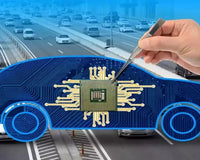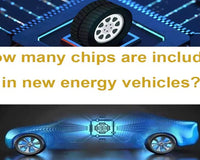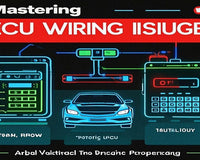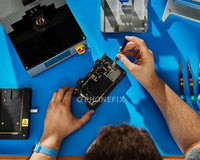In the modern automotive landscape, the Engine Control Unit (ECU) chip stands as the brain of a vehicle, orchestrating a symphony of complex operations to ensure optimal performance, efficiency, and emissions control. However, like any sophisticated electronic component, the ECU chip is susceptible to failure, which can have a cascading effect on a car's functionality. 
Problems Caused by ECU Chip Failure.
1. Engine Misfires and Rough Idling.
One of the most common symptoms of ECU chip failure is engine misfires and rough idling. The ECU is responsible for precisely controlling the ignition timing, fuel injection, and air - fuel ratio. When the ECU chip malfunctions, it may send incorrect signals to the engine's components, resulting in incomplete combustion. XTOOL A30D OBD2 bidirectional scanner communicates with the vehicle's ECU to retrieve diagnostic trouble codes. These codes provide valuable information about the nature and location of the problem, allowing mechanics to quickly identify the root cause of the issue.
2. Poor Fuel Efficiency.
A failing ECU chip can also have a significant impact on a car's fuel efficiency. XTOOL D6S OBD2 scanner can access various data and make fuel corrections. Since the ECU regulates the amount of fuel injected into the engine based on various factors such as engine load, speed, and temperature, any inaccuracies in its operation can result in either over - or under - fueling. 
3. Starting Difficulties.
Starting issues are another telltale sign of ECU chip failure. The ECU plays a vital role in the starting process by coordinating the ignition system, fuel pump, and starter motor. If the ECU chip is faulty, it may not send the appropriate signals to these components, preventing the engine from starting properly.
4. Electrical System Malfunctions.
ECU is integrated with many other electrical systems in the car, such as the transmission control unit, anti - lock braking system (ABS), and power steering. When the ECU chip fails, it can disrupt the communication between these systems, leading to a variety of electrical malfunctions. UT109 multimeter can be used to check the electrical connections and components related to the ECU, which helps technicians determine if there are any electrical faults in the ECU circuit.
5. Check Engine Light Illumination.
The check engine light is often the first indication that something is wrong with the vehicle, and in many cases, it can be triggered by ECU chip failure. When the ECU detects a problem with any of the systems it controls, it sets a diagnostic trouble code (DTC) and illuminates the check engine light. While the check engine light can indicate a wide range of issues, a failing ECU chip is a common culprit.
Methods for Solving ECU Chip - Related Problems.
1. ECU Reprogramming
In many cases, ECU chip failure is caused by a software glitch or an outdated firmware version. In such situations, reprogramming can correct issues related to engine performance, fuel efficiency, and emissions control, and it may also address some electrical system malfunctions.
2. ECU Repair
If the ECU chip has a hardware problem, such as a faulty integrated circuit or a damaged circuit board, it may be possible to repair the ECU instead of replacing it. This can be a more cost - effective option compared to replacing the entire ECU, especially for older or high - end vehicles where new ECUs can be expensive.
3. ECU Replacement
In some cases, when the ECU chip is severely damaged or beyond repair, the only solution is to replace the entire ECU. When replacing the ECU, it's important to ensure that the new unit is compatible with the vehicle's make, model, and year. This often requires the use of an ECU programming tool and may need to be done by a qualified automotive technician.
4. Wiring and Connection Checks
Sometimes, ECU - related problems may be caused by faulty wiring or loose connections. Before replacing or repairing the ECU, it's essential to thoroughly inspect the wiring harness and all electrical connections related to the ECU. Any damaged or frayed wires should be repaired or replaced, and loose connections should be tightened or re - seated. This simple step can often resolve issues that appear to be caused by ECU chip failure but are actually due to electrical problems in the surrounding components.
ECU chip failure can cause a wide range of car problems, from engine misfires and poor fuel efficiency to starting difficulties and electrical system malfunctions. Understanding the problems caused by ECU chip failure and the available solutions is essential for maintaining the performance, reliability, and safety of your vehicle. If you suspect that your car's ECU chip may be failing, it's recommended to consult a qualified automotive technician who has the expertise and equipment to diagnose and fix the problem promptly.
How a Faulty ECU Chip Slowly Damages Your Car’s Health










